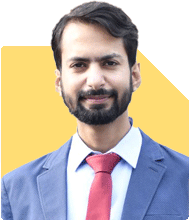R P Yadav | Answer |Ask -Follow
HR, Workspace Expert - Answered on Apr 22, 2024
Over the years, he has been the recipient of numerous awards including the Lifetime Achievement Award from World HR Congress and HR Person Of The Year from Public Relations Council of India.
... more

Hello sir, What subjects should the student pickup in 11 th grade to study Law and what are the different competitive exams for studying law? Does the student need any coaching for these competitive exams?
After completion of 12th, one can apply for LLB in any private institute, college or universities. The admission in the institute depends on the marks obtained in class 11th and 12th.
You may like to see similar questions and answers below
Sushil Sukhwani | Answer |Ask -Follow
Study Abroad Expert - Answered on Jun 20, 2023
Mayank Kumar | Answer |Ask -Follow
Education Expert - Answered on Jul 26, 2023
Neeraj Batra | Answer |Ask -Follow
CA, CS, Commerce Expert - Answered on Jun 25, 2023
Mayank Chandel |2575 Answers |Ask -Follow
IIT-JEE, NEET-UG, SAT, CLAT, CA, CS Exam Expert - Answered on Jun 27, 2024
Radheshyam Zanwar |6744 Answers |Ask -Follow
MHT-CET, IIT-JEE, NEET-UG Expert - Answered on Aug 13, 2024
Dr Dipankar Dutta |1841 Answers |Ask -Follow
Tech Careers and Skill Development Expert - Answered on Dec 14, 2025
Nayagam P P |10854 Answers |Ask -Follow
Career Counsellor - Answered on Dec 14, 2025
Radheshyam Zanwar |6744 Answers |Ask -Follow
MHT-CET, IIT-JEE, NEET-UG Expert - Answered on Dec 14, 2025
Radheshyam Zanwar |6744 Answers |Ask -Follow
MHT-CET, IIT-JEE, NEET-UG Expert - Answered on Dec 14, 2025
Dr Dipankar Dutta |1841 Answers |Ask -Follow
Tech Careers and Skill Development Expert - Answered on Dec 14, 2025
Dr Dipankar Dutta |1841 Answers |Ask -Follow
Tech Careers and Skill Development Expert - Answered on Dec 13, 2025
Dr Dipankar Dutta |1841 Answers |Ask -Follow
Tech Careers and Skill Development Expert - Answered on Dec 13, 2025
Mayank Chandel |2575 Answers |Ask -Follow
IIT-JEE, NEET-UG, SAT, CLAT, CA, CS Exam Expert - Answered on Dec 13, 2025
Radheshyam Zanwar |6744 Answers |Ask -Follow
MHT-CET, IIT-JEE, NEET-UG Expert - Answered on Dec 13, 2025
Mayank Chandel |2575 Answers |Ask -Follow
IIT-JEE, NEET-UG, SAT, CLAT, CA, CS Exam Expert - Answered on Dec 13, 2025























